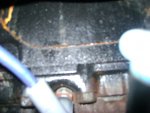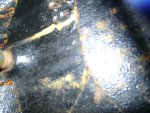Re: Cracked block from freezing?
Lots of mis-information here.
Point 1: GM and Ford designed the engines to run with AF in them all the time. Running them in a raw water cooled set up will cause a lot of rust to form inside. Eventually this rust will form an insulating layer on top of the cast iron that will impair heat transfer and you will have chronic overheating.
Point 2: here in salt water land (coastal Long Island) it is a well known fact that most inboards will rust out before they wear out, or water ingestion from rusted exhaust will cause it to fail. You don't see worn bearings, rings too often. Heads, intake manifolds, blocks, they all can rust through.
Point 3: adding AF the way I learned by simply reading the OMC shop manual takes all of 10 minutes and the end of my winterization. I have a 25 year old engine that has not rusted through yet and it's been moored and used in salt water 6 months of the year for at least 15 years!!! Sorry freshwater guys I know far more about this than any if you will ever need to. My mechanic marvels at the fact that my old I/O has outlasted many outboards that are the preferred choice here.
So I have to ask, what, is so hard about pouring AF into the big hose at the top end after draining, till you see it appear at the thermo housing, or filling each manifold till some AF runs out on the ground (why you must use no tox AF)?
You want to talk hard, well try spitting open a salt water used outdrive that has not been taken apart for a few years. That's hard, but being here in salt water you learn ways that work better so you can get it done.
Point 4: do what you want, what I am trying to teach you all is simply what both OMC and Merc recommended in their manuals; I can't take credit for it but I can take credit for proving IT WORKS!
Last points....2 ways of knowing you don't have a lot of flaking rust in the block/heads
1) you change your thermostat and see no flaking rust in the intake manifold
2) you change your front water pump and see no flaking rust in the block cooling passages, or even in the 22 year old pump you just took off!
3) back when we drove American cars with all cast iron engines, just like our GM marine motors, GM et al told you to replace the antifreeze every 3 years, why, to prevent freezing, well no not really, to REDUCE CORROSION. This applies to marine engines too. The cast iron is the same, the process of corrosion is the same. If you ran water in your collectable car, drained it out in the fall so it would not freeze, and did this year after year vs having AF in it all the time guess what method would give longer life?
And when you start it up in the spring, you don't have rusty water coming out the exhaust, you WILL see this on engines that are stored dry though.....
All my experience in salt water tells me that any inboard should be closed cooled at least for the block/heads....that would give the best engine life/cooling performance over the years...here we have some closed cooled inboard gas V8s that have well over 30 years on em and guess what, they can actually last longer than outboards if you go with closed cooling and replace the exhaust risers/gaskets when needed.























